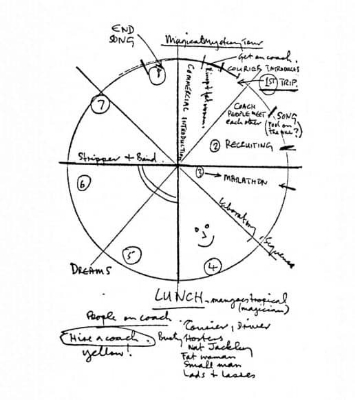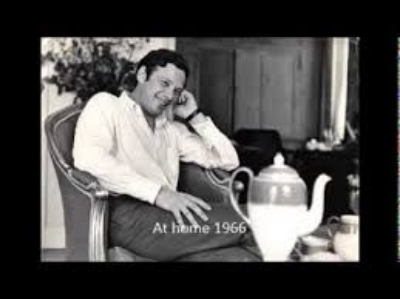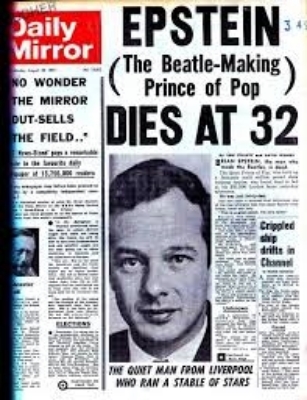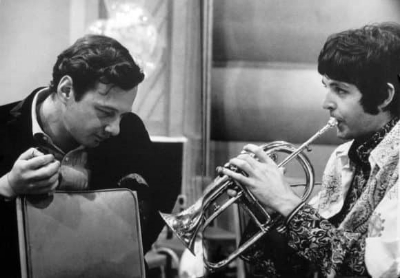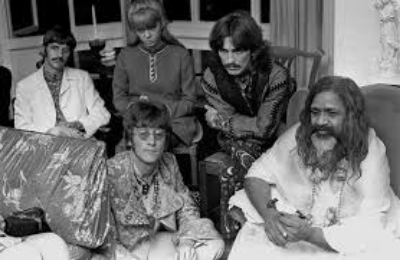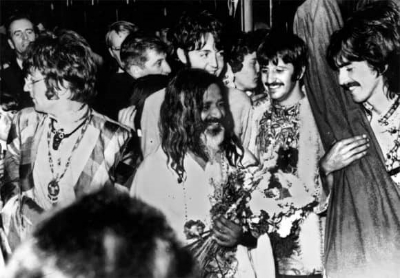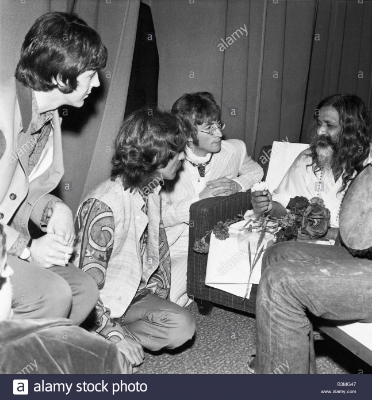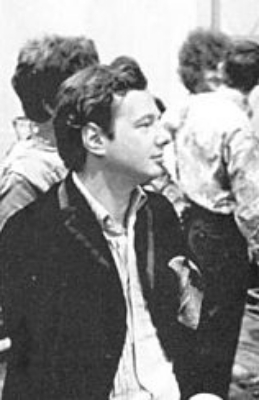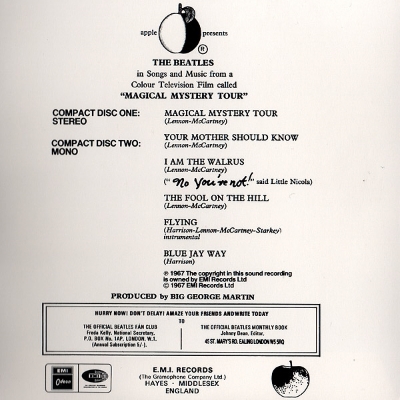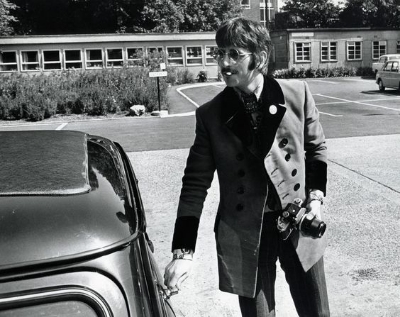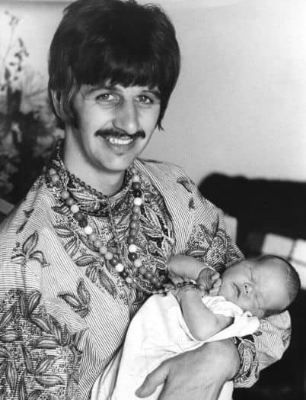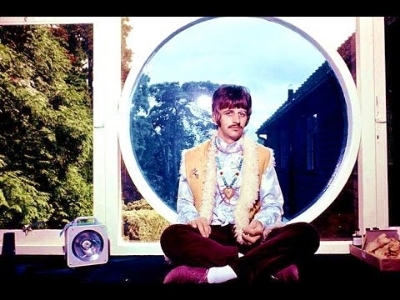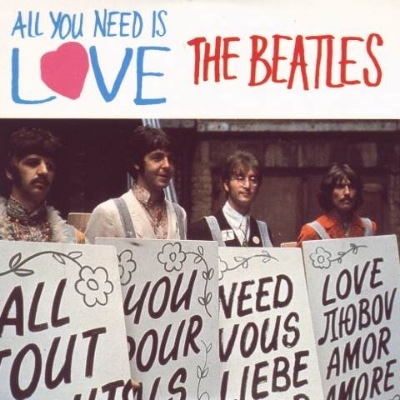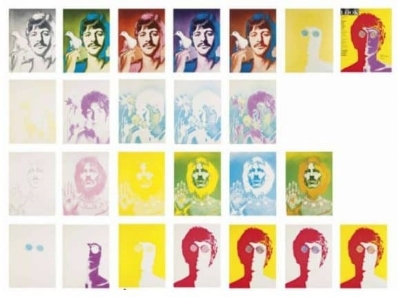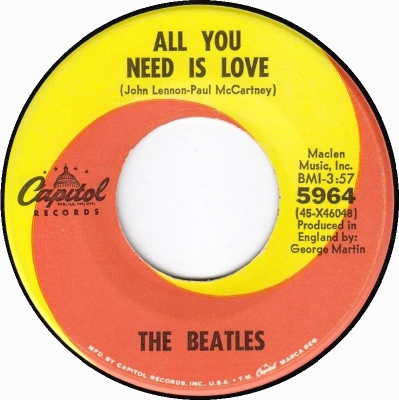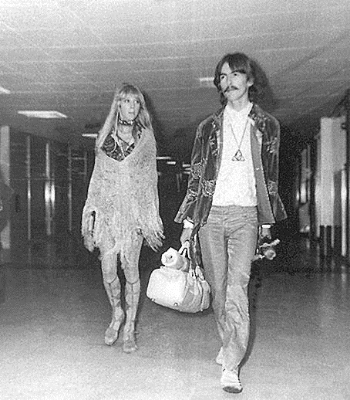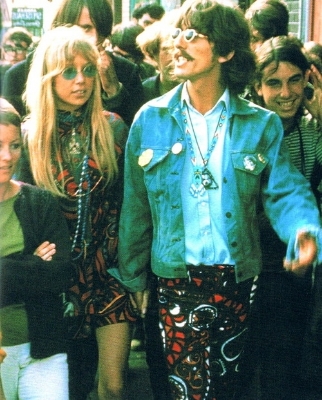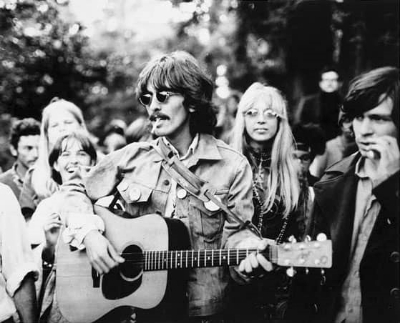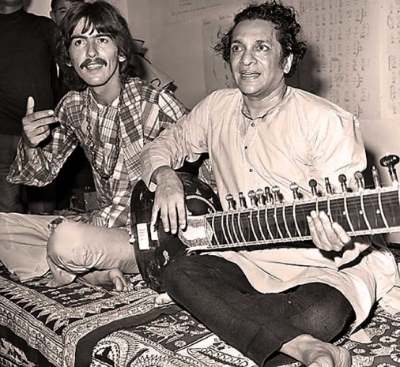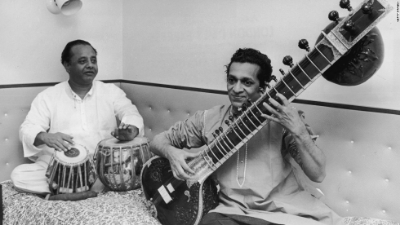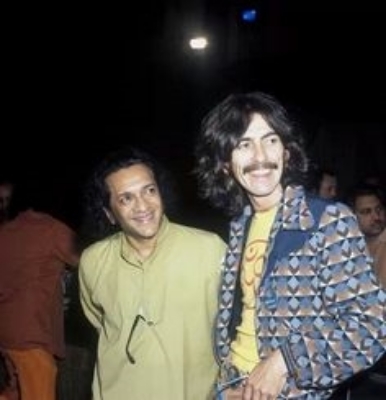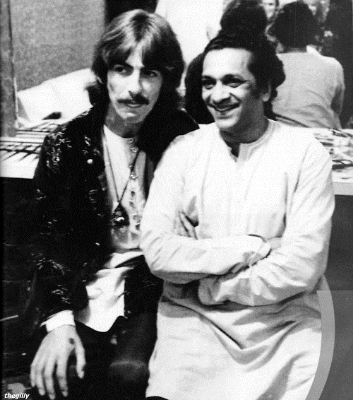Paul produced his now-legendary drawing of a Magical Mystery Tour cake sliced up into segments to represent eight essential sequences for inclusion in the film. He had written key words that would prompt him when describing the proposed production to others: Commercial, Introduce Tour, Get On Coach, Courier Introduces, Recruiting, Marathon, Laboratory Sequence, Stripper & Band, End Song? ...
Paul made it clear to me that his aim was to make a feature-length film for full-scale theatrical release and he felt that a successful screen 'tour' would go a long way towards plugging the gaping hole left by the axing of the Fab Four's concert trips. Indeed, if Paul had managed to produce one successful theatrically released feature film with The Beatles each year, a far bigger potential audience would have seen the group than did in the touring years, and the profit margin for the boys would have been enormous.
When the rest arrived he delegated different Beatles to take care of each segment, encouraging them to come up with their own musical and/or comedy content for specific sequences that would last 10 or 15 minutes. He said his concept was based on the old idea of seaside coach trips, mystery tours, 'but this one will have an additional touch of fantasy because four magicians will be at work to make wonderful things happen'. Paul insisted that filming must begin the following week, by which time we'd need to have a big yellow bus organised and decorated, a supporting cast of professional actors and variety artists, the necessary cameramen and technical crew and a route for the bus to take us down to Cornwall, our West Country destination.
Fab Four Blog
The Beatles issue a statement on NEMS Enterprises
Four days after the death of Brian Epstein, The Beatles issued a statement about the future of his management company, NEMS Enterprises.
The group revealed that they would continue to be managed by NEMS until further notice, but that Clive Epstein, Brian's brother, would not be their personal manager. "No one could possibly replace Brian," Paul McCartney was quoted as saying.
An official press statement added:The Beatles would be willing to put money into NEMS if there was any question of a takeover from an outsider. The Beatles will not withdraw their shares from NEMS. Things will go on as before.
After the 1967 death of Beatles manager Brian Epstein, Paul McCartney's answer was to urge the other three members of the group to press ahead with the project that he had been dreaming up, the Magical Mystery Tour television movie. The Beatles were to script, direct, and produce the film themselves, but without Brian's guiding hand this was a recipe for disaster. Musically, they hadn't yet put a foot wrong, but when it came to dealing with the world of cinema they were simply out of their range.
"[Paul] came and showed me what his idea was, and this is how it went ... the production and everything," John Lennon recalled for Rolling Stone interviewer Jann Wenner. "He said, 'Well, here's the segment, you write a little piece for that.' And I thought ... 'I've never made a film, what's he mean, write a script!' So I ran off and wrote the dream sequence for the fat woman, and all the things with the spaghetti and all that. It was like that."
Memorial service for Brian Epstein
The Beatles didn't attend Brian Epstein's funeral in Liverpool on 29 August 1967, they did attend a memorial service later in October.
Beatles Mourn Death Of Manager in London
The Beatles today mourned the death of their manager, Brian Epstein, but took solace from a mystic. Epstein, a school dropout who took the Mersey beat out of Liverpool cellars, turned it into a musical revolution and made millions along the way, was ' found dead Sunday in his , London apartment. He was 32. The long-haired quartet which 1 he molded into a household ‘ name throughout the world was 1 in Wales on a retreat with the Indian mystic Maharishi Mahesh Yogi when informed of Epstein’s death. They said their mediatation with the mystic made it easier to face Epstein’s death. AH four Beatles returned to London in hired cars within 12 hours after hearing the news. “Brian was one of us-one of the boys, you might say,’’ . said Beatle George Harrison “The news has been a sad blow to us.” Beatle John Lennon said the instruction he and the other Beatles had received from the mystic “has helped me to overcome my grief more easHy than I could have before.” Epstein was found dead in the bedroom of liis London home. His Spanish butler entered the room Sunday afternoon when he could get no response from knocking at the door and found him dead in bed. “Mr. Epstein was alone in the house last night. He appeared to be quite well,” the butler said. “A terrible and stupid accident,” said Don Black, a business associate, said after viewing the body. He would not elaborate. One of the two Scotland Yard officers summoned to the house, Commander J. Lawler, said it was “a sudden death. There will probably be a post mortem examination, but this is a matter for the coroner.” Epstein found the beatles in 1962 singing in Liverpool’s Cavern Club. They w'ere making $10.30 a night. He nurtured their image and kept them away from barbers and at the time of his death they and he were multi-millionaires. He was looked on as “the fifth Beatle” by those close to the group. Epstein always defended the Beatles in their increasingly frequent controversies. When the Beatles made news over admitting taking LSD and smoking marijuana, Epstein told an interviewer he had also been “turned on,”
Brian Epstein dies
Late on the night of Friday 25 August 1967, The Beatles' manager Brian Epstein was found dead at his home in Chapel Street, London.
Epstein had invited his assistant Peter Brown and the chief executive of NEMS, Geoffrey Ellis, to spend the bank holiday weekend at Kingsley Hill, his house in Warbleton, East Sussex. At the time The Beatles were in Bangor, north Wales, with Maharishi Mahesh Yogi.
Epstein also asked another assistant, Joanne Newfield, to come, and to bring along a mutual friend, the Scottish singer Lulu. However, both women had prior engagements and declined Epstein's offer. Nonetheless, Epstein departed his London home in good spirits on the afternoon of 25 August, and was joined later in Sussex by Brown and Ellis.
A young man with whom Epstein hoped to become better acquainted did not show up. Epstein was disappointed at the prospect of having to spend the long public holiday with two friends he saw frequently, and following dinner - during which he drank a considerable amount - Epstein chose to drive back to London in his Bentley convertible.
Shortly after Epstein's exit, a London taxi arrived at Kingsley Hill containing four people Epstein had invited. Although surprised that the host had left, they stayed the night at the house, partying with Brown and Ellis.
After lunch on Saturday 26 August, Brown spoke to Epstein on the telephone.
He called late in the afternoon and was speaking in a woozy voice. He apologized for not coming back and maybe letting us worry. I suspect that when he went back to London he did go out, cruised the West End for a bit and then went home.
I urged him to come back to the country. But there was no way he could drive back because he sounded pretty awful, and I suggested him coming on the train. It was an unlikely thing for him to do but it was the only thing I could think of at the time.
Peter Brown
The Brian Epstein Story, Deborah GellerEpstein's Spanish butler, Antonio, and his wife Maria, saw their employer when he returned late on the Friday, but heard nothing from him on the Saturday. By the following day they had become worried. They were unable to contact Brown and Ellis, but Antonio did speak to Joanne Newfield. She urged him not to worry, but did decide to go to Chapel Street to check in the early afternoon.
Since it was Sunday, there was no one around and it was a very quick trip across town. I got to Chapel Street, let myself in, found Antonio and went up to Brian's door and knocked on it. There were double doors leading into a dressing room and then there was a single door leading into a bedroom, so there was quite a bit of a distance between the hallway and Brian's room.I knocked on the door and I called out his name. I called, 'Answer the door. Are you there?' And then I went up to my room and I tried the intercom, and there was no reply...
I knew I didn't want to be there on my own. Antonio and Maria couldn't speak very good English and they were a very shy couple. I needed someone nearer, that could be a support system. So I called Peter back and I told him that Dr Cowan wasn't there and Peter suggested I call his doctor, John Galway. He was there so I told him that I was concerned about Brian and asked if he could come over to the house. He would. And in the meantime I also called a few other people but I couldn't find them. Then I found Alistair [Taylor] and asked him to come to the house.
Then John Galway arrived and we went up to Brian's room, up to the outside doors. Antonio and John Galway broke the doors down. I think in the meantime I'd called Peter back and left the line hanging. Then I went up as they broke the doors down.
Antonio and John Galway were in and I followed them. Maria was staying behind. The curtains were drawn and John Galway was directly ahead of me. I could just see part of Brian in the bed and I was just totally stunned. I knew that something really bad had happened. Then I think John Galway told me, 'Just wait outside.' I stood in the doorway. A few minutes later John Galway came out. I've never seen a doctor so white. We were all white and we knew that Brian had died.
Joanne Newfield
The Brian Epstein Story, Deborah GellerIn the meantime, Brown was waiting on the telephone line. Galway informed him that Epstein had died, and Brown called David Jacobs, a lawyer and friend to Epstein who lived in Brighton. He and Ellis then left for London.
Epstein's personal assistant Alistair Taylor arrived at the house. Those who found Epstein's body were still in a state of shock, and went to the study to have a brandy. They delayed calling the police as they wanted to first make sure there were no illegal substances in the house.
Within literally very few minutes of the police being informed, there's a ring on the doorbell and it's a reporter I knew. He just looked at me and said, 'What are you doing here? I hear Brian's ill.' And I said, 'No, he's fine. He's gone out. He just called me over, actually. You know what he's like, you know, typical Brian. I've come over specially on a Sunday morning and he's gone out in the car.' Then I wondered if the garage door was closed because if the car's sitting there the reporter's going to say, 'Which car?' I was concerned that, before this news broke, somehow we had to get hold of [Epstein's mother] Queenie, and we couldn't find her.Alistair Taylor
The Brian Epstein Story, Deborah GellerJoanne Newfield was surprised at the reactions of Geoffrey Ellis and Peter Brown when they arrived at Chapel Street.
Peter and I were good friends, and I was really wanting him to get back. I remember the first thing I asked was why did Brian come back from Kingsley Hill? Neither of them answered. They just started to go up the stairs. And I remember thinking that they seemed weird and I knew there was something wrong.They appeared distant when I expected them to be grief-stricken. I expected that Peter would give me a hug, but he didn't. He was just cool and I'm not sure that it was shock. I've asked myself many times what happened in Kingsley Hill. It's just one of the question marks I have about Brian's death.
Joanne Newfield
The Brian Epstein Story, Deborah GellerAn inquest found the cause of death to be accidental, resulting from 'incautious self-overdoses' of Carbrital, a drug taken to assist sleep.
I don't think there was anything sinister in his death. There were rumours of very sinister circumstances, but I personally think it was a drink-and-sleeping-pills overdose. I think what happened - and there's no evidence whatsoever except people I talk to - was that Brian was going down to his house in the country. It was a Friday night, and there were going to be friends there. Brian was gay and I think there were going to be young men at the house. Brian went down with one of his friends, but no one had showed up - so he thought: 'Ugh - it's Friday night! I've got time to get back to London if I rush. Then I can get back to the clubs.' It seems feasible to me, knowing Brian. Then he drove back up to London and went to the clubs, but they were all closing and there was not a lot of action.So he had a few bevvies, then to console himself had a sleeping pill or two before to bed Brian always did that, he was quite into the pills. And then I think he woke up in the middle of the night and thought: My God, I can't sleep. I haven't had a pill.' Then he had a few more pills, and I think that could have killed him.
I went round a couple of days later and saw Brian's butler. He didn't seem to feel there was anything suspicious, nor that Brian was in any kind of black mood. My feeling was that it was an accident.
Paul McCartney
Anthology
The Beatles renounce the use of drugs
The day after their arrival in Bangor, north Wales, The Beatles attended an introductory seminar given by Maharishi Mahesh Yogi, after which they spoke to reporters.
There was a press conference. It was suggested that as we were going with the Maharishi, it might be a good idea to accommodate the press; it also saved them waiting around outside our windows. I don't remember that we specifically said that we'd given up drugs - but at the time I think we probably had, anyway.The seminar was held in the main hall of the Hugh Owen Buildings, now part of Bangor University. Around 300 people attended. Maharishi joined The Beatles for the press conference afterwards, during which they announced that they had given up taking drugs.
George Harrison: LSD isn't a real answer. It doesn't give you anything. It enables you to see a lot of possibilities that you may never noticed before, but it isn't the answer. You don't just take LSD and that's it forever, you're OK. To get really high, you have to do it straight. I want to get high, and you can't get high on LSD. You can take it and take it as many times as you like, but you get to a point that you can't get any further unless you stop taking it.
Paul McCartney: You cannot keep on taking drugs forever. You get to the stage where you are taking fifteen aspirins a day, without having a headache. We were looking for something more natural. This is it. It was an experience we went through. Now it's over and we don't need it any more. We think we're finding other ways of getting there.
George Harrison: It helps you find fulfilment in life, helps you live life to the full. Young people are searching for a bit of peace inside themselves.
John Lennon: Don't believe that jazz about there's nothing you can do, and 'turn on and just drop out, man' - because you've got to turn on and drop in, or they're going to drop all over you.George Harrison: We don't know how this will come out in the music. Don't expect to hear Transcendental Meditation all the time. We don't want this thing to come out like Cliff and Billy Graham.
After the press conference John Lennon found notes belonging to a reporter in a telephone booth.
It had the heading 'Paul, George, Ringo, John Lennon and Jagger' plus details of what each had been wearing. 'You've taken over from me,' said John to Mick Jagger, pointing out to him how the reporter had named each of them. 'I just used to be called Lennon when I was wicked. Now I'm John Lennon. I haven't yet reached the next stage of just being John. You're still Jagger.'The Beatles
Hunter Davies
The Beatles travel to Bangor
Following their initial meeting with Maharishi Mahesh Yogi on 24 August 1967, The Beatles, along with Cynthia Lennon, Pattie Harrison, her sister Jenny, Alexis Mardas, Mick Jagger and Marianne Faithfull, travelled to Bangor, north Wales, to embark upon a 10-day conference on Transcendental Meditation.
Cyn and I were thinking of going to Libya, until this came up. Libya or Bangor? Well, there was no choice, was there?
Anthology
The Beatles were to travel on the same train as Maharishi and his party. The resulting press scrum meant that their departure was anything but smooth, however.
It was a bright, sunny morning when we set off. I was ready early, but Pattie, George, and Ringo were coming in our car, and were late. By the time Anthony drew up at the station entrance we were cutting it fine and had five minutes to catch the train. John leapt out of the car with the others and ran for the platform - leaving me to follow with our bags. It was the result of years in which he'd taken it for granted that others would see to all the details. I followed him as fast as I could. The station was mayhem, with fans, reporters, police and passengers all milling around. I struggled to push my way through, but when I got to the platform my way was barred by a huge policeman who, unaware that I was with the Beatles party, said, 'Sorry, love, too late, the train's going,' and pushed me aside.
I shouted for someone to help. John poked his head out of the train window, saw what was happening and yelled, 'Tell him you're with us! Tell him to let you on.'
It was too late. The train was already pulling away from the platform and I was left standing with our bags, tears pouring down my cheeks. It was horribly embarrassing. Reporters were crowding around me, flashbulbs were popping and I felt a complete fool. Peter Brown, Brian's assistant, had come to see us off: he put his arm around me and said he'd take me to Bangor by car. 'We'll probably get there before the train,' he assured me, anxious to cheer me up.
But what neither he nor anyone else knew was that my tears were not simply about the missed train. I was crying because the incident seemed symbolic of what was happening to my marriage. John was on the train, speeding into the future, and I was left behind.
John
Neil Aspinall drove Cynthia to Bangor, in a journey lasting around six hours, and she rejoined The Beatles' party. Aspinall went to see friends staying in a caravan in north Wales, and didn't attend any of Maharishi's lectures.
The Beatles, meanwhile, were in a first class compartment, travelling for the first time in many years without their manager Brian Epstein or their assistants Aspinall and Mal Evans. Maharishi was in another first class compartment, seated cross-legged on a white sheet laid out by his followers.
As the train approached Bangor The Beatles discussed travelling onto the next station to avoid the waiting camera crews and reporters, and taking taxis to Bangor instead. Maharishi, however, told them they should stick close to him, which they duly did.
Maureen had had the baby and everything was really cool, so we all went to Wales to meet Maharishi. He didn't know who we were then, which was really fabulous. Only when we got off the train and he saw all the kids running, I think then he may have felt, 'Wow, things are looking up for me.' They ran right past him and were looking in our faces, and I think he realised that these boys could get his message across real fast.
Anthology
The group were staying in dormitories at Bangor college, along with around 300 other followers of Maharishi. The rooms contained bunk beds and basic chests of drawers - a far cry from the comforts The Beatles were used to.
It was a bit funny going to those camps because it was like going back to school. Just the nature of it meant staying in a classroom and we'd been used to our nice comfortable homes or hotels so to be staying in an old school on a camp bed was a little bit disconcerting. Then trying to learn to meditate. It's not that easy, you don't just pick it up like that, it's an effort and you've got to be involved, so it was like going back to school. And of course the food was all canteen food. But we were interested enough to learn the system, which we did.
Many Years From Now, Barry Miles
That evening the group, plus Mick Jagger and Marianne Faithfull, went to the Senior Chinese restaurant, the only such establishment open late in Bangor. At the end of the meal they realised they didn't have enough money between them to pay the bill.
We went out to a Chinese restaurant in Bangor and ate on our own - just the Beatles, myself, maybe one or two others. When the bill came, we couldn't pay. The Chinese waiter amazingly didn't recognize them, and he was afraid we were going to do a runner. Suddenly, George put his bare foot on the table and opened the sole of his sandal, where he had hidden a £20 note. The Beatles were like the royal family. They didn't have money, didn't use money. But George had put this £20 note there just for this sort of situation.
The Beatles meet Maharishi Mahesh Yogi
Encouraged by Pattie Harrison, The Beatles and their partners - minus Ringo and Maureen Starkey, whose second child Jason had been born five days previously - attended a lecture by Maharishi Mahesh Yogi at the Hilton Hotel on Park Lane, London.
Tickets for the lecture cost seven shillings and sixpence each.
Maharishi came to a hall in London and we all got tickets and sat down near the front row. There were a lot of flowers on the stage and he came on and sat cross-legged. And he looked great and he talked very well and started to explain, and I still think his idea is fine.
Many Years From Now, Barry Miles
The Harrisons had become interested in Eastern philosophy during a six-week holiday in Bombay towards the end of 1966. The following year Pattie attended a lecture on Transcendental Meditation at Caxton Hall, London, where she had been given her mantra. Inspired by her new discovery, she encouraged George to accompany her to Maharishi's lecture at the Hilton.
Then, joy of joys, I discovered that Maharishi was coming to London in August to give a lecture at the Hilton Hotel. I was desperate to go, and George said he would come too. Paul had already heard of him and was interested, and in the end we all went - George, John, Paul, Ringo, Jane and I. Maharishi was every bit as impressive as I thought he would be, and we were spellbound.At the end we went to speak to him and he said we must go to Wales where he was running a ten-day summer conference of the Spiritual Regeneration Movement. It started in two days' time. We leapt at it.A press conference followed the lecture, after which a 90-minute private audience with Maharishi was held for Lennon, McCartney, Harrison and the rest of their party. The yogi's words left them keen to learn more, and they made arrangements to travel to Bangor, North Wales, the next day to attend the weekend seminar being held there.On August 24, all of us except Ringo attended the lecture, given by Maharishi at the Hilton Hotel. I got the tickets. I was actually after a mantra. I had got to the point where I thought I would like to meditate. I'd read about it and I knew I needed a mantra - a password to get through into the other world. And, as we always seemed to do everything together, John and Paul came with me.
George Harrison
Anthology
Recording: Your Mother Should Know
Chappell Recording Studios, London
Producer: George Martin
Engineer: John Timperley
This was the second recording session for the Magical Mystery Tour song Your Mother Should Know, and took place at the independent London studio Chappell.
A reduction mix was firstly created to allow for more overdubs. This mix, numbered take nine, combined both of Paul McCartney's vocal tracks into one, and piano and drums onto another.
Two more tracks of backing vocals were then recorded, and rhythm guitar added to the choruses. The song was then left until 16 September 1967.
This was The Beatles' final recording session prior to the death of their manager Brian Epstein on August 27, 1967. Epstein was actually present during this session, although his involvement was minimal.
He came in to hear the playbacks looking extremely down and in a bad mood. He just stood at the back of the room listening, not saying much.
Source: The Complete Beatles Recording Sessions, Mark Lewisohn
Recording: Your Mother Should Know
Chappell Recording Studios, London
Producer: George Martin
Engineer: John Timperley
The Beatles' first recording session since June 26, 1967 took place at Chappell Recording Studios in Maddox Street, London, as EMI Studios was fully booked.
The Beatles worked on Your Mother Should Know, a Paul McCartney composition written for the Magical Mystery Tour soundtrack. They recorded eight takes of the backing track, with McCartney on piano and Ringo Starr on drums.
McCartney then added two vocal overdubs onto the eighth take, and a rough mix was made. An acetate disc was pressed of this mix, and was used during the production of the Magical Mystery Tour film.
The Beatles enjoying a little break
Ringo Starr arrives at Queen Charlotte’s Hospital in London August 20, 1967, to visit his wife Maureen and their newly born, second son.
Jason Starkey is born
Ringo Starr and Maureen Starkey's second son, Jason, was born on 19 August 1967. He was the third Beatles baby after Julian Lennon and Zak Starkey.
Like his elder brother, Jason was born in Queen Charlotte's Hospital in Hammersmith, London. His name was chosen by his mother.
In later years Jason worked in the music industry, becoming a road manager and drummer. He once described his famous family as a burden, saying: "Being Ringo Starr's son is the biggest drag of my life. It's a total pain."
In 1987 Jason Starkey was fined £125 after being caught stealing a car stereo, and two years later appeared twice in court on drugs charges. He played in a succession of bands including Buddy Curtis and the Grasshoppers, The People's Friend, Empire Of Sponge, and with his brother Zak, Musty Jack Sponge and the Exploding Nudists.
Despite his earlier problems with drugs and the law, Jason settled down in England with his wife Flora and two sons Louie and Sonny.
All You Need Is Love - The Beatles
Ringo Starr photos at his home in Weybridge - August 17, 1967 Cartoonist gerald scarfe sketches ringo ...
The #1 song in the US on August 16, 1967
All You Need Is Love - The Beatles
The Beatles enjoying a break today.
The Beatles enjoying a break today.
The #1 song in the US on August 13, 1967
All You Need Is Love - The Beatles
The Beatles are taking a break.
The Beatles are photographed by Richard Avedon
The Beatles were photographed by Richard Avedon on this day. The shoot took place at a photographic studio in a penthouse in Thompson House, 200 Gray's Inn Road, London.
The American photographer took a number of shots of the group, four of which were later adorned with psychedelic effects. They were first published in the 9 January 1968 edition of the US magazine Look, and were subsequently sold as posters.
In the UK they first appears in the Daily Express newspaper, in February 1968. Readers were given the chance to buy enlargements of the set, along with a special Beatles poster.
The following image is a colour proof of the photographs, prepared for the edition of Look magazine.
All You Need Is Love - The Beatles
George and Pattie Harrison return from America
Following a week's break on the West Coast of the United States, George Harrison, his wife Pattie, and Neil Aspinall and Alexis "Magic Alex" Mardas returned to England on this day.
They flew back to London via New York. During their time in the US, the Harrisons spent time with Ravi Shankar and other Indian musicians, with The Beatles' former publicist Derek Taylor, and with Pattie's sister Jenny Boyd.
The band member known as The Quiet Beatle had his loud-and-clear say about hippies and the Haight-Ashbury in the Summer of Love.
Harrison is quoted saying he thought the Haight “would be something like King’s Road (in London), only more. Somehow I expected them to all own their own little shops. I expected them all to be nice and clean and friendly and happy.”
Instead, after touring the hippie ‘hood and encountering a “wild band of jeering hippies” during an impromptu song sesh on nearby Hippie Hill in Golden Gate Park, Harrison declared hippies to be “hideous, spotty little teenagers.”
Harrison said, “I went there expecting it to be a brilliant place, with groovy gypsy people making works of art and paintings and carvings in little workshops. But it was full of horrible spotty drop-out kids on drugs, and it turned me right off the whole scene.”
George Harrison visits Haight-Ashbury in San Francisco
After spending six days in Los Angeles, George Harrison, his wife Pattie, Neil Aspinall, Derek Taylor and Alexis "Magic Alex" Mardas, flew to San Francisco, where they walked around the hippy district of Haight-Ashbury.
The visit to Haight-Ashbury wasn't the purpose of their time in San Francisco; they had gone there to visit Pattie Harrison's sister Jenny Boyd.The area is named after the intersection of two streets, Haight and Ashbury, and as we approached, the driver said he wouldn't drive down the street itself, he'd park among the side-streets. It seemed a little odd but we didn't argue. We got out of the car, the acid kicked in and everything was just whoah, psychedelic and very... I mean, it was just completely fine. We went into a shop and noticed that all these people were following us. They had recognised George as we walked past them in the street, then turned to follow us. One minute there were five, then ten, twenty, thirty and forty people behind us. I could hear them saying, 'The Beatles are here, the Beatles are in town!'
We were expecting Haight-Ashbury to be special, a creative and artistic place, filled with Beautiful People, but it was horrible - full of ghastly drop-outs, bums and spotty youths, all out of their brains. Everybody looked stoned - even mothers and babies - and they were so close behind us they were treading on the backs of our heels. It got to the point where we couldn't stop for fear of being trampled. Then somebody said, 'Let's go to Hippie Hill,' and we crossed the grass, our retinue facing us, as if we were on stage. They looked as us expectantly - as if George was some kind of Messiah.
We were so high, and then the inevitable happened: a guitar emerged from the crowd and I could see it being passed to the front by outstretched arms. I thought, Oh, God, poor George, this is a nightmare. Finally the guitar was handed to him. I had the feeling that they'd listened to the Beatles' records, analysed them, learnt what they'd thought they should learn, and taken every drug they'd thought the Beatles were singing about. Now they wanted to know where to go next. And George was there, obviously, to give them the answer. Pressure.
George was so cool. He said, 'This is G, this is E, this is D,' and showed them a few chords, then handed back the guitar and said, 'Sorry, man, we've got to go now.' He didn't sing - he couldn't have: he was flying. We all were. I was surprised he could even do that.
Anyway, we got up and walked back towards our limo, at which point I heard a little voice say, 'Hey, George, do you want some STP?'
George turned around and said, 'No, thanks, I'm cool, man.'
Then the bloke turned round and said to the others, 'George Harrison turned me down.'
And they went, 'No!'
And then the crowd became faintly hostile. We sensed it because when you're that high you're very aware of vibes, and we were walking faster and faster, and they were following.
When we saw the limo, we ran across the road and jumped in, and they ran after us and started to rock the car, and the windows were full of these faces, flattened against the glass, looking at us.
Pattie Boyd
Wonderful Tonight
We also went to see my sister Jenny, who was living with a friend in San Francisco. We flew there in a private Lear jet with Derek Taylor and Neil Aspinall and were met by a limo, then picked up Jenny, and we all went to have lunch. Afterwards we thought it would be fun to go and have a look at Haight-Ashbury, the district that had been taken over by hippies. Musicians like Jefferson Airplane, Grateful Dead and Janis Joplin lived there, and it was the LSD capital of America. On the way, Derek produced a tab. Would we like some? Since we were going to Haight-Ashbury, it seemed silly not to.
The area is named after the intersection of two streets, Haight and Ashbury, and as we approached, the driver said he wouldn't drive down the street itself, he'd park among the side-streets. It seemed a little odd but we didn't argue. We got out of the car, the acid kicked in and everything was just whoah, psychedelic and very... I mean, it was just completely fine. We went into a shop and noticed that all these people were following us. They had recognised George as we walked past them in the street, then turned to follow us. One minute there were five, then ten, twenty, thirty and forty people behind us. I could hear them saying, 'The Beatles are here, the Beatles are in town!'
We were expecting Haight-Ashbury to be special, a creative and artistic place, filled with Beautiful People, but it was horrible - full of ghastly drop-outs, bums and spotty youths, all out of their brains. Everybody looked stoned - even mothers and babies - and they were so close behind us they were treading on the backs of our heels. It got to the point where we couldn't stop for fear of being trampled. Then somebody said, 'Let's go to Hippie Hill,' and we crossed the grass, our retinue facing us, as if we were on stage. They looked as us expectantly - as if George was some kind of Messiah.
We were so high, and then the inevitable happened: a guitar emerged from the crowd and I could see it being passed to the front by outstretched arms. I thought, Oh, God, poor George, this is a nightmare. Finally the guitar was handed to him. I had the feeling that they'd listened to the Beatles' records, analysed them, learnt what they'd thought they should learn, and taken every drug they'd thought the Beatles were singing about. Now they wanted to know where to go next. And George was there, obviously, to give them the answer. Pressure.
George was so cool. He said, 'This is G, this is E, this is D,' and showed them a few chords, then handed back the guitar and said, 'Sorry, man, we've got to go now.' He didn't sing - he couldn't have: he was flying. We all were. I was surprised he could even do that.
Anyway, we got up and walked back towards our limo, at which point I heard a little voice say, 'Hey, George, do you want some STP?'
George turned around and said, 'No, thanks, I'm cool, man.'
Then the bloke turned round and said to the others, 'George Harrison turned me down.'
And they went, 'No!'
And then the crowd became faintly hostile. We sensed it because when you're that high you're very aware of vibes, and we were walking faster and faster, and they were following.
When we saw the limo, we ran across the road and jumped in, and they ran after us and started to rock the car, and the windows were full of these faces, flattened against the glass, looking at us.
George Harrison dines at Ravi Shankar’s house
On the sixth day of his US trip, George Harrison paid a visit to Ashish, the son of sarod player Ali Akbar Khan, in Los Angeles.
The others in his party - his wife Pattie, Neil Aspinall and Alexis "Magic Alex" Mardas went to Disneyland. In the evening they regrouped and dined at the LA home of Ravi Shankar.
George Harrison attends an Alla Rakha recording session
On the fifth day of his US trip, George Harrison attended a recording session by the Indian musician Alla Rakha in Los Angeles.
Afterwards Harrison, his wife Pattie plus Neil Aspinall and Alexis "Magic Alex" Mardas, went for a meal in the city's Olvera Street, accompanied by Derek Taylor and his family.
George Harrison watches Ravi Shankar at the Hollywood Bowl
On the fourth day of their US trip, George Harrison, his wife Pattie, Neil Aspinall and Alexis "Magic Alex" Mardas went to see Ravi Shankar perform at the Hollywood Bowl in Los Angeles.
George Harrison and Ravi Shankar hold a press conference
On the third day of their US trip, George Harrison, Neil Aspinall and Alexis "Magic Alex" Mardas returned to Ravi Shankar's music school in Los Angeles.
Harrison and Shankar held a press conference at the Kinnara School of Music to promote Shankar's Hollywood Bowl concert, which was taking place the following day. Harrison's wife Pattie was not present; her sister Jenny Boyd had flown from San Francisco, and the pair went sightseeing in Los Angeles.
In the evening the Harrisons and Derek Taylor attended a Mamas And The Papas recording session.
- 1970
- 1969
- 1968
- 1967
- 1966
- 1965
- 1964
- 1963
- 1962

